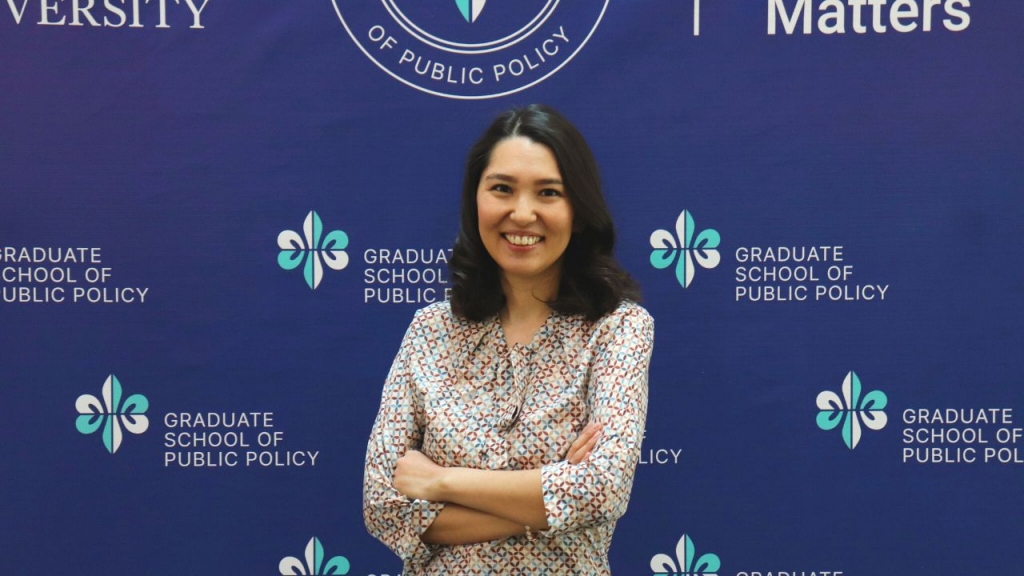NU Step to Ph.D.: Zhanar Ashikbayeva, Ph.D. in Public Policy graduate
27.07.2022
31-year-old Zhanar Ashikbayeva graduated from the NU GSPP. In her doctoral dissertation, she explores the problem of self-selection and management efficiency. In her opinion, morality in the public sector affects what kind of people come to work there.
Can you tell us a little bit about your education and professional experience?
In 2011, I received my bachelor’s degree from the University of Buffalo, American State University of New York, majoring in Finance. At the same time, I worked at Aquasol Corporation as an international sales manager. I also completed a master’s degree in financial analysis at Cardiff University in the UK. Then, I worked for two years as a senior expert in the Center for Macroeconomic and Applied Mathematical Economic Research at the Economic Research Institute (ERI), where I was involved in country analysis and forecasting, as well as global economic analysis. She worked closely with the OECD, McKinsey & Company, the Asian Development Bank, and the World Bank and participated in the organization of the VI-VII Astana Economic Forum.
In 2015 I joined the Graduate School of Business at NU as a teaching assistant. I was the liaison between students, faculty, representatives from Duke Fuqua School of Business, and managers of the Executive MBA program and Full-time MBA program. I assisted professors and students in corporate Finance, capital raising, financial statement analysis, and other subjects in the EMBA and FTMBA programs. When the NU Graduate School of Public Policy launched its Ph.D. program for the first time in 2017, I applied and successfully graduated this year with a Ph.D. in Public Policy.
Tell us about your doctoral research?
My dissertation was on self-selection and good governance. Assuming that the level of corruption in a country is primarily a projection of the moral attitudes of officials, I investigated how self-selection in the labor market affects people’s choice of public service or the private sector. In the experiment, I found out how prone students were to cheating and compared these results with their desire to work in government agencies and other sectors. I found out the students’ level of honesty by using dice (dice task game). Sitting in front of the computer, the participants guessed the number that should fall out.
After the machine “threw” the dice, we matched the obtained point with the participant’s number. The experiment’ participants were financially motivated to fudge the results in their favor: if the figures coincided, the player received a reward, and if they did not, the player got nothing. To identify non-selfish preferences, I used the experimental Dictator game, often used in behavioral economics. One of the two players, the “dictator,” has a certain amount of money to divide between himself and the other participant, the “victim,” at his discretion. The latter has a passive role and accepts the amount allocated to him by the “dictator.”
What is the applied significance of your work?
The formed level of morality in the public sector determines its future, influencing which people – honest or adventurous – choose to work for society.
The level of corruption in Kazakhstan is relatively high – in the 2022 Corruption Perception Index, the country ranks 102nd out of 180. Participants in the experiment who showed dishonest behavior often chose the civil service as a possible place of work after their graduation. In my opinion, one of the reasons why Kazakhstan’s anti-corruption policies are failing is not because their strategies are improperly designed or implemented but because they do not consider the problem of self-selection.
How can self-selection improve the implementation of anti-corruption strategies?
Policymakers need to account for self-selection when developing strategies for combating corruption. The public sector attracts individuals with a propensity for corruption, then corrupt self-selection may undermine the institutions that form the cornerstone of the rule of law and compromise the agencies responsible for combating corruption in society more broadly.
Attracting candidates with integrity, and for filtering out candidates with unfavorable traits is only possible with a more transparent process that enhances the sphere of individual and economic freedoms, limited power to government and bureaucracy, free speech, open inquiry, and the primacy of the rule of law.
What can you tell us about the process of working on your dissertation?
The process of working on my dissertation was not an easy one because I used an experiment in my research. Participants in such economic experiments must make the decisions based on a money approach, meaning they are paid as much as they win. In my situation, funding was a source of concern. Sometimes the funding source can be unreliable or limited. So, I recommend that students at least set aside some money for emergencies and not be afraid to seek advice from their supervisors.
Can you tell us about your plans?
Currently, with my supervisor, I am working on my publications and planning to do postdoctoral studies abroad. I want to continue my research in this direction.
What would you wish for future doctoral students?
Getting a Ph.D. is a challenging task. Being a Ph.D. student means having a job that never ends. You don’t go home at the end of the day knowing your work is done. Several years of hard work take a lot of time, courage, perseverance, knowledge, dedication, discipline, and more. I want to wish future students a great desire to learn and achieve their goals, and most importantly, good luck in finding your thesis advisor who will support you and guide you properly throughout your work on your thesis.
Source: nu.edu.kz

